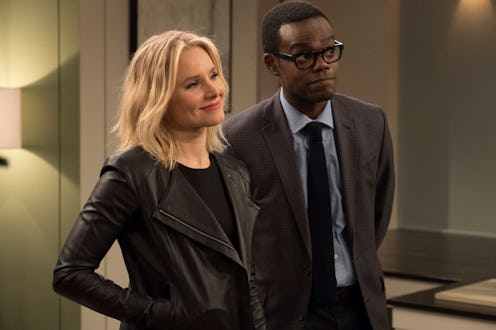
For a half-hour comedy, The Good Place cuts deep. Its first season was whimsical, inventive, and wildly entertaining, but it was also surprisingly profound, examining the blurred boundaries of what constitutes "good" and "bad." That dichotomy is still the crux of The Good Place Season 2, but the premiere episode broadens the conversation to address the hands of fate. Whereas Season 1 pondered the difference between action and intent, Season 2 seems to wonder if, in the long run, both will land you in the same place. Spoilers for The Good Place Season 2 premiere ahead.
A key part of that is the idea of soulmates. In The Good Place — or rather, The Bad Place, as the finale twist revealed — soulmates are seemingly nothing more than a means by which infernal architect Michael (Ted Danson) aims to reinvent torture, opting for psychological torment over the violent fire and demons preferred by his devil peers. Eleanor (Kristen Bell) is initially paired with Chidi (William Jackson Harper), an eternally conflicted philosophy nerd whose indecisiveness and moral virtue are, much to Eleanor's chagrin, the pitch-perfect foil to her impulsive, self-indulgent nature. Materialistic do-gooder Tahani (Jameela Jamil), on the other hand, is coupled with Jason (Manny Jacinto), a moronic slacker bro duped into keeping up an act as a silent monk named Jianyu.
In Season 1, Eleanor and Chidi eventually fall for one another — an inevitability predicted by decades worth of opposites attract-style rom-coms — while Jason inexplicably finds love with personal assistant Janet (D'Arcy Carden), the afterlife equivalent of an omnipotent Siri.
In Season 2, however, Michael decides to split up his human test subjects in fear that they'll once again figure out his duplicitous scheme. This time, Eleanor gets matched with a buff, shallow gym rat who runs away every time she tries to confess she doesn't belong; Jason is doomed to a life of silence with a (fake) fellow monk; Tahani winds up with a short but humble refugee doctor, forcing her to confront her false self-perception on an endless loop; and Chidi must choose between two soulmates, a decision that quite literally signifies his personal hell.
But soon enough, they all realize something is off and find their way back to one another: Eleanor seeks out Chidi for help, a lonely Jason turns to Janet for comfort. Yes, things are eased along by the note Eleanor cleverly left for herself before their memories were wiped, but something about it seems inescapable, predetermined, right. Chidi's speech about how he's never met Eleanor but feels like he knows her mirrors the romantic cliché of feeling like "you've known someone forever," and when Eleanor cheekily calls him out, it seems intentional: "That definitely sounded like a pick-up line," she smirks.
As a show centered around the afterlife, it makes sense that The Good Place would toy with fate. The idea that we're destined to end up with some pre-determined soulmate dates back centuries — Dante and Beatrice, Romeo and Juliet, Plato's Symposium — and it's often tied to philosophy and religion, where discussions of heaven and hell (or the "Good Place" and "Bad Place," as it applies here) are vast.
How "soulmate" is defined widely varies, but the most common conception is that it's someone who "completes" you, and The Good Place does well to represent that in a way that's realistic, not idealized. Chidi and Eleanor's relationship is messy, combative, and flawed, but somehow, they're good for one another. Eleanor gives Chidi courage to step outside his comfort zone and seize his life (or death, as the case may be), while Chidi seems to be the only person capable of grounding her, of challenging her, and because of that, he pushes her to be a better person. The same goes for Jason and Janet. Odd as their relationship is, Janet is logical and straightforward, while Jason is ditzy but endearing: Jason gives her heart and Janet gives him reason.
Only one episode into Season 2, it's difficult to discern what, exactly, The Good Place is trying to say about fate, but just as in Season 1, the point is that it's contemplating it: They may all be in hell, but is it coincidence that they were the ones to wind up in this beta-tested purgatory, or is it something more? Something undeniable? Something that, no matter what Michael readjusts, will always end the same? Perhaps, like life, The Good Place doesn't have those answers, but it's a damn good reason to keep watching.